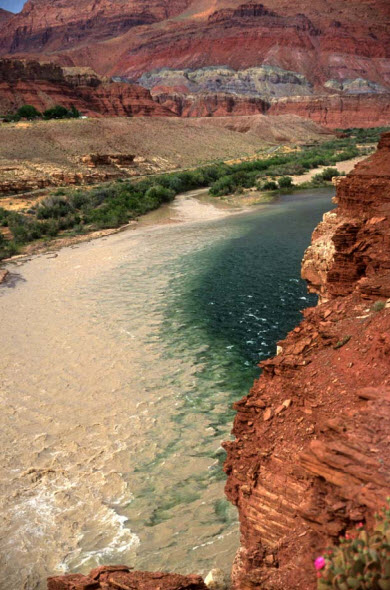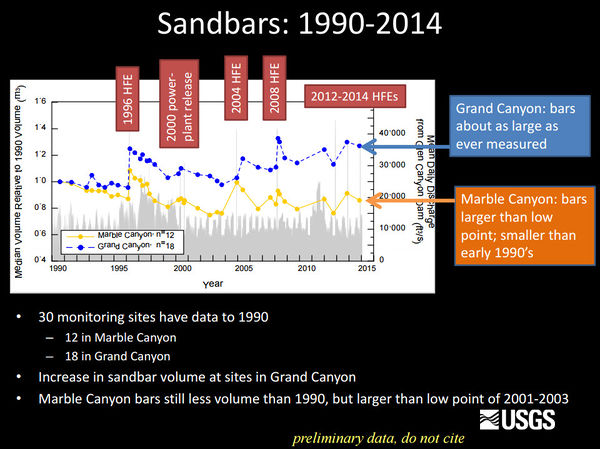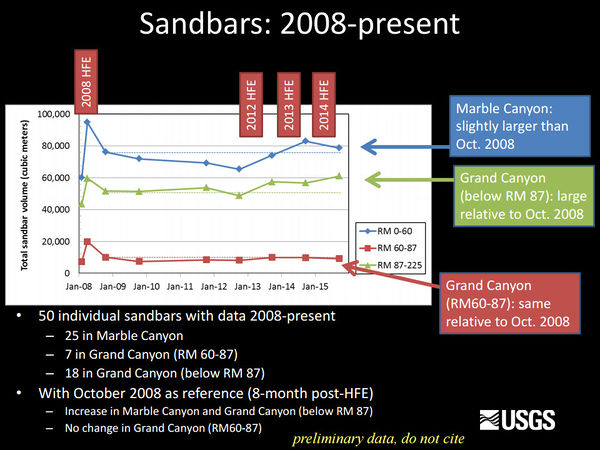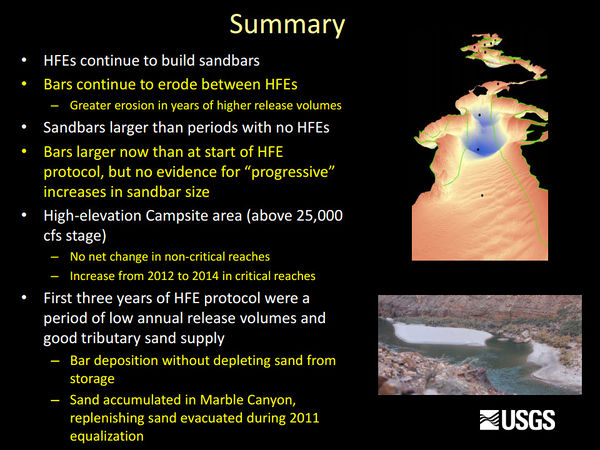Difference between revisions of "GCDAMP Sediment"
Cellsworth (Talk | contribs) |
Cellsworth (Talk | contribs) |
||
| Line 25: | Line 25: | ||
[http://www.gcmrc.gov/research_areas/sediment_geomorphology/sed/Sed_Geomorph_Home_Page.aspx '''Sediment and Geomorphology'''] <br> | [http://www.gcmrc.gov/research_areas/sediment_geomorphology/sed/Sed_Geomorph_Home_Page.aspx '''Sediment and Geomorphology'''] <br> | ||
| − | Erosion of sandbars (beaches) along the Colorado River in Grand Canyon was first reported in the early 1970s, approximately 10 years after completion of Glen Canyon Dam. Since then, scientific studies have been conducted to monitor changes in sandbars and changes in the amount of sand stored on the bed of the river. One of the outcomes of these studies has been the implementation of flow experiments intended to rebuild eroded sandbars, especially by the release of controlled floods, also called | + | Erosion of sandbars (beaches) along the Colorado River in Grand Canyon was first reported in the early 1970s, approximately 10 years after completion of Glen Canyon Dam. Since then, scientific studies have been conducted to monitor changes in sandbars and changes in the amount of sand stored on the bed of the river. One of the outcomes of these studies has been the implementation of flow experiments intended to rebuild eroded sandbars, especially by the release of controlled floods, also called “high-flow experiments,” from Glen Canyon Dam. The sediment and geomorphology projects at Grand Canyon Monitoring and Research Center include the collection and processing of data to provide information needed to conduct controlled floods and to evaluate the outcome of each controlled flood and the long-term effects of controlled floods and normal dam operations on sediment-related resources. |
| − | '''Desired Future Condition:'''<br> | + | [[Portal:Desired Future Conditions -DFCs| '''Desired Future Condition for Sediment-Related Resources:''']]<br> |
High elevation open riparian sediment deposits along the Colorado River in sufficient volume, area, and distribution so as to provide habitat to sustain native biota and desired ecosystem processes<br> | High elevation open riparian sediment deposits along the Colorado River in sufficient volume, area, and distribution so as to provide habitat to sustain native biota and desired ecosystem processes<br> | ||
• Nearshore habitats for native fish<br> | • Nearshore habitats for native fish<br> | ||
| Line 78: | Line 78: | ||
|- | |- | ||
|style="color:#000;"| | |style="color:#000;"| | ||
| − | *[http://gcdamp.com/index.php?title=The_HFE_Page | + | *[http://gcdamp.com/index.php?title=The_HFE_Page The HFE Page] |
|- | |- | ||
| Line 84: | Line 84: | ||
|- | |- | ||
|style="color:#000;"| | |style="color:#000;"| | ||
| − | *[http://www.gcmrc.gov/discharge_qw_sediment/station/GCDAMP/09380000 | + | *[http://www.gcmrc.gov/discharge_qw_sediment/station/GCDAMP/09380000 Colorado River at Lees Ferry] |
| − | *[http://www.gcmrc.gov/discharge_qw_sediment/station/GCDAMP/09382000#/ | + | *[http://www.gcmrc.gov/discharge_qw_sediment/station/GCDAMP/09382000#/ Paria River at Lees Ferry] |
| − | *[http://www.gcmrc.gov/discharge_qw_sediment/station/GCDAMP/09383050 | + | *[http://www.gcmrc.gov/discharge_qw_sediment/station/GCDAMP/09383050 Colorado River at 30 mile] |
| − | *[http://www.gcmrc.gov/discharge_qw_sediment/station/GCDAMP/09383100 | + | *[http://www.gcmrc.gov/discharge_qw_sediment/station/GCDAMP/09383100 Colorado River above LCR] |
| − | *[http://www.gcmrc.gov/discharge_qw_sediment/station/GCDAMP/09403000 | + | *[http://www.gcmrc.gov/discharge_qw_sediment/station/GCDAMP/09403000 Bright Angel Creek] |
| − | *[http://www.gcmrc.gov/discharge_qw_sediment/station/GCDAMP/GCMRC-MCLT6 | + | *[http://www.gcmrc.gov/discharge_qw_sediment/station/GCDAMP/GCMRC-MCLT6 Shinumo Creek] |
| − | *[http://www.gcmrc.gov/discharge_qw_sediment/station/GCDAMP/09402352 | + | *[http://www.gcmrc.gov/discharge_qw_sediment/station/GCDAMP/09402352 Colorado River abv Lava Canyon rm66] |
| − | *[http://www.gcmrc.gov/discharge_qw_sediment/station/GCDAMP/09403270 | + | *[http://www.gcmrc.gov/discharge_qw_sediment/station/GCDAMP/09403270 Colorado River bl rm127] |
| − | *[http://www.gcmrc.gov/discharge_qw_sediment/station/GCDAMP/09403850 | + | *[http://www.gcmrc.gov/discharge_qw_sediment/station/GCDAMP/09403850 Kanab Creek] |
| − | *[http://www.gcmrc.gov/discharge_qw_sediment/station/GCDAMP/09404115 | + | *[http://www.gcmrc.gov/discharge_qw_sediment/station/GCDAMP/09404115 Havasu Creek] |
| − | *[http://www.gcmrc.gov/discharge_qw_sediment/station/GCDAMP/09404120 | + | *[http://www.gcmrc.gov/discharge_qw_sediment/station/GCDAMP/09404120 Colorado River abv National Canyon] |
| − | *[http://www.gcmrc.gov/discharge_qw_sediment/station/GCDAMP/09404200 | + | *[http://www.gcmrc.gov/discharge_qw_sediment/station/GCDAMP/09404200 Colorado River bl Diamond Creek] |
| − | *[http://www.gcmrc.gov/discharge_qw_sediment/station/GCDAMP/09404220 | + | *[http://www.gcmrc.gov/discharge_qw_sediment/station/GCDAMP/09404220 Colorado River abv Spencer rm246] |
|- | |- | ||
Revision as of 16:19, 24 June 2016
|
|
Erosion of sandbars (beaches) along the Colorado River in Grand Canyon was first reported in the early 1970s, approximately 10 years after completion of Glen Canyon Dam. Since then, scientific studies have been conducted to monitor changes in sandbars and changes in the amount of sand stored on the bed of the river. One of the outcomes of these studies has been the implementation of flow experiments intended to rebuild eroded sandbars, especially by the release of controlled floods, also called “high-flow experiments,” from Glen Canyon Dam. The sediment and geomorphology projects at Grand Canyon Monitoring and Research Center include the collection and processing of data to provide information needed to conduct controlled floods and to evaluate the outcome of each controlled flood and the long-term effects of controlled floods and normal dam operations on sediment-related resources. Desired Future Condition for Sediment-Related Resources: |
| --- |
--- |
--- |
|---|



